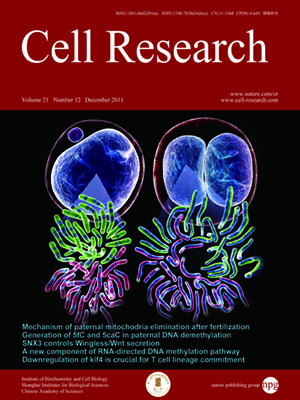
Volume 21, No 12, Dec 2011
ISSN: 1001-0602
EISSN: 1748-7838 2018
impact factor 17.848*
(Clarivate Analytics, 2019)
Volume 21 Issue 12, December 2011: 1701-1710
ORIGINAL ARTICLES
Downregulation of the transcription factor KLF4 is required for the lineage commitment of T cells
Xiaomin Wen, Haifeng Liu, Gang Xiao and Xiaolong Liu
State Key Laboratory of Cell Biology, Institute of Biochemistry and Cell Biology, Shanghai Institutes for Biological Sciences, Chinese Academy of Sciences, 320 Yueyang Road, Shanghai 200031, China
Correspondence: Xiaolong Liu,(+86-21-54921178 )
The roles of the reprogramming factors Oct4, Sox2, c-Myc and Klf4 in early T cell development are incompletely defined. Here, we show that Klf4 is the only reprogramming factor whose expression is downregulated when early thymic progenitors (ETPs) differentiate into T cells. Enforced expression of Klf4 in uncommitted progenitors severely impaired T cell development mainly at the DN2-to-DN3 transition when T cell lineage commitment occurs and affected the transcription of a variety of genes with crucial functions in early T cell development, including genes involved in microenvironmental signaling (
IL-7Rα), Notch target genes (
Deltex1), and essential T cell lineage regulatory or inhibitory genes (
Bcl11a,
SpiB, and
Id1). The survival of thymocytes and the rearrangement at the
Tcrb locus were impaired in the presence of enforced Klf4 expression. The defects in the DN1-to-DN2 and DN2-to-DN3 transitions in Klf4 transgenic mice could not be rescued by the introduction of a TCR transgene, but was partially rescued by restoring the expression of IL-7Rα. Thus, our data indicate that the downregulation of Klf4 is a prerequisite for T cell lineage commitment.
Cell Research (2011) 21:1701-1710. doi:10.1038/cr.2011.183; published online 22 November 2011
FULL TEXT | PDF
Browse 2000


